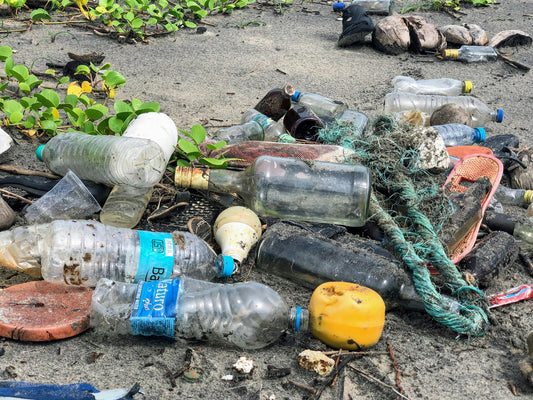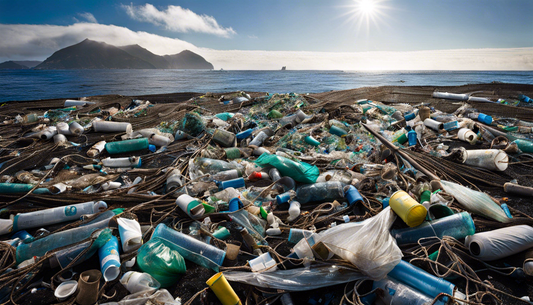Share
Nigeria's 'Rubbish' Situation: Is the Country Ready for a Single-Use Plastic Ban?
A Lagos-based sustainability consultant, Labake Ajiboye-Richard, recently witnessed someone casually littering from their vehicle. This incident epitomizes Nigeria's problem with waste, especially plastic. According to the World Bank, Nigeria ranks as one of the largest contributors to global solid waste, generating about 27.6m kilotonnes annually, with plastics accounting for 13%. Illustrating the scale of the issue, UN research revealed that as many as 50-60 million used water sachets are discarded daily on Lagos streets alone.
Ban Around the Corner, But Are They Ready?
Facing this escalating plastic problem, Nigerian authorities announced an impending ban on single-use plastics, effective from next month. However, there's doubt about the country's preparedness. Observations reveal food vendors still heavily relying on Styrofoam and other disposable single-use plastics, while some Lagos traders aren't even aware of the approaching ban. With the country grappling with a crucial cost of living crisis, most citizens' priority remains survival, overshadowing the significant but seemingly distant plastic crisis.
Meeting the Challenge, or More Talk Than Action?
Although the Nigerian government has started adopting sustainability measures and promising extensive sensitization campaigns for ban enforcement, skepticism persists. Adewunmi Emoruwa of public strategy and media group Gatefield terms the anti-plastic policy implementation as “lacklustre.” He further criticizes the industry's failure to clean up its act and lack of alignment between fiscal strategies and policy.
Reconnecting with Old Practices for a Better Future
The widespread use of plastic in daily routines is a relatively new practice in African culture. For example, food was conventionally wrapped in banana leaves, and fermentation processes were customary to prolong the shelf life of consumables. Ajiboye-Richard advocates reintegrating these traditional practices and offering incentives for attitude change. Unless such strategies are put into action, she predicts that single-use plastic would likely remain on shelves until at least 2030.
A Lagos-based sustainability consultant, Labake Ajiboye-Richard, recently witnessed someone casually littering from their vehicle. This incident epitomizes Nigeria's problem with waste, especially plastic. According to the World Bank, Nigeria ranks as one of the largest contributors to global solid waste, generating about 27.6m kilotonnes annually, with plastics accounting for 13%. Illustrating the scale of the issue, UN research revealed that as many as 50-60 million used water sachets are discarded daily on Lagos streets alone.
Ban Around the Corner, But Are They Ready?
Facing this escalating plastic problem, Nigerian authorities announced an impending ban on single-use plastics, effective from next month. However, there's doubt about the country's preparedness. Observations reveal food vendors still heavily relying on Styrofoam and other disposable single-use plastics, while some Lagos traders aren't even aware of the approaching ban. With the country grappling with a crucial cost of living crisis, most citizens' priority remains survival, overshadowing the significant but seemingly distant plastic crisis.
Meeting the Challenge, or More Talk Than Action?
Although the Nigerian government has started adopting sustainability measures and promising extensive sensitization campaigns for ban enforcement, skepticism persists. Adewunmi Emoruwa of public strategy and media group Gatefield terms the anti-plastic policy implementation as “lacklustre.” He further criticizes the industry's failure to clean up its act and lack of alignment between fiscal strategies and policy.
Reconnecting with Old Practices for a Better Future
The widespread use of plastic in daily routines is a relatively new practice in African culture. For example, food was conventionally wrapped in banana leaves, and fermentation processes were customary to prolong the shelf life of consumables. Ajiboye-Richard advocates reintegrating these traditional practices and offering incentives for attitude change. Unless such strategies are put into action, she predicts that single-use plastic would likely remain on shelves until at least 2030.
We hope you enjoyed this article. Please feel free to leave a comment below if you want to engage in the discussion.
If you want to read more like this, make sure to check out our Blog and follow us on Instagram. If you are interested in truly sustainable products, check out our Shop.
Check out the original source here.








